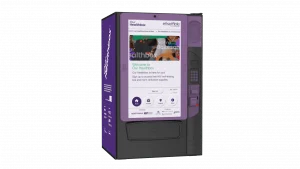Back to school shopping season is a good time to be focused on value and quality, whether you need new clothes, new electronics or more in-class supplies. It’ll cost the average student in Canada – or their family – roughly $570 to get ready for the upcoming school year (according to research from CPA Practice Advisor and Deloitte).
What’s more, talk of tariffs, inflation, and supply chain uncertainties are certainly impacting our shopping habits more this year than others, causing us to think about the impact of our purchases, and to explore new ways to get stuff.
So BTS 2025 is a time to think about options, like whether to consider recycled, refurbished or second-hand alternatives.
And while some retailers have offered equipment trade-ins and gadget swaps before, a new electronics trade-in program from Staples Canada is ramping up just in time for students back-to-school needs.
Canadians can swap old phones, laptops, and tablets for redeemable gift cards as part of the newly launched Staples Trade-in by Allstate program, designed to save shoppers money and help save the planet, too.
Families and students who want to save money and reduce e-waste ahead of the back-to-school season now have a straightforward way to trade in their smartphones, laptops and tablets.
Describing their older gear by answering a few online questions about the make, model and specs of a device they’d like to trade-in, program participants can receive an instant quote. Once accepted, the trade-in value is issued as a Staples e-gift card, good for use at any Staples location in Canada. Devices can be dropped off at a local Staples store or shipped directly to Allstate using a prepaid shipping label.
It’s a significant upgrade from past trade-in efforts the company has made, making it easier than ever to turn old tech into instant value, and it’s part of overall company efforts to boost environmental sustainability and support community development, Staples says.
To both cut waste and create real value from old devices, “[i]t’s faster, more flexible, and more sustainable than anything we’ve offered before,” Ryan Mair, Chief Services Officer, Staples Canada, described in an e-mail exchange with WhatsYourTech.
Mair added that “we’re able to offer higher trade-in values for devices. The whole process

The new equipment trade-in program at Staples is “faster, more flexible, and more sustainable than anything we’ve offered before,” says Ryan Mair, Chief Services Officer, Staples Canada.
takes about five minutes – customers receive instant quotes, prepaid shipping, and immediate e-gift card value, all backed by Allstate’s expertise in device lifecycle management.”
Allstate, an American insurance company, runs Allstate Protection Plans, which provides coverage for appliances and electronics that protects owners from common malfunctions and mechanical and electrical failures from normal use—including complex internal parts that can stop working years after purchase.
The Staples trade-in program takes advantages of Allstate’s experience in the circular economy of electronic lifecycle management, including device valuation, logistics coordination, secure shipping, certified refurbishment, and responsible recycling. Devices that can be refurbished and restored re-enter the economy. Those that can’t be reused are recycled by certified partners.
It’s said that every year, we generate some 2.6 million tonnes of e-waste. By 2030, just five years from now, more than 82 billion kilograms of e-waste will be on our hands, according to the latest UN Global E-waste Monitor.
“Our smartphones and laptops and countless other devices are a crucial part of our lives, yet we often dispose of them long before necessary, making the global e-waste problem even worse,” said Andreas Nobell, a founding member of the Circular Electronics Initiative.
Proponents of the circular economy concept like Nobell encourage us all to reduce e-waste by recycling and reusing more equipment, upgrading and repairing devices that could last longer, as well as being more open to buying remanufactured products.
Retailers are also buying into the idea.
At Staples Canada, for example, recycling services have been offered for several years; then, in 2022, the company expanded its recycling programs and began a buy-back program for customers’ old tech. In its 2024 Community Impact and Sustainability Report, the company reports recycling more than 10 million tonnes of electronics, as well as millions of ink and toner cartridges and even millions of writing instruments.
The latter is thanks Staples’ partnership with Canadian waste management company TerraCycle, and their Free Recycling Program—one of this country’s only in-store solutions for recycling writing tools, it’s open to individuals, schools, offices, or community organizations.
Once collected, items are sent to TerraCycle for cleaning, sorting, and transforming them into raw materials for new products like outdoor furniture, storage bins, and playground surfaces.

Staples Canada appointed Rachel Huckle as CEO effective March 1, 2024. She previously served as Chief Retail Officer (2019), and President and Chief Operating Officer (2022) at the company. (CNW Group/Staples Canada ULC)
“These milestones reflect our dedication to empowering Canadians and building stronger communities,” said Rachel Huckle, CEO, Staples Canada, referring to the company’s recycling initiatives, sustainability goals, and community initiatives, like the trade-in program, its annual School Supply Drive, and even the Even the Odds initiative, which is not about tech recycling but bettering people’s health.
Since 2021, Staples Canada has partnered with a group at St. Michael’s Hospital in Toronto working at the MAP Centre for Urban Health Solutions, where they look at issues around health equity and the social determinants of health.
But Even the Odds does have a unique tech component: ‘smart’ vending machines called Healthboxes that dispense free HIV self-tests and other essential health supplies such as naloxone and condoms. The machines also offer wellness products (such as menstrual and hygiene items, or seasonal essentials like hats and gloves), and harm reduction supplies for the specific needs of people in each community in which they’re installed.
Developed by Dr. Sean B. Rourke at St Mike’s, the machines feature interactive touchscreens just like commercially available vending machines, but with important health information and a service directory to help users connect with local healthcare services and supports.

Smart vending machines called Healthboxes dispense essential health supplies, with support from Staples’ Even the Odds initiative and other organizations.
The units can be equipped with real-time data analytics that monitor usage patterns, revealing that to date, the machines have been visited over 118,000 times, distributing more than 48,000 health and harm reduction supplies.
Various other public and private organizations also support the Healthbox initiative, with more than a dozen machines located across the country.
Staples has supported the group’s activities with a multi-year, multi-million-dollar commitment that includes various public awareness and fundraising activities, and a dollar-for-dollar match of customer donations up to $500,000 each year; installs in Atlantic Canada are funded by Staples Canada and the MAP Centre.
As far as the current equipment trade-in program is concerned, Mair reports that since the launch last month, smartphones have been the most popular trade-in device so far.
“Heading into the back to school season, we anticipate that we’ll see an increase in laptop and tablet trade-ins,” he added. “Smartphones tend to have shorter upgrade cycles, while laptops and tablets are a key focus for families preparing for the school year.”
Smartphones, laptops, and tablets and the most in-demand categories for back-to-school and everyday tech upgrades, Mair noted, adding that “we may explore opportunities in the future to expand eligibility to other categories, based on customer demand and sustainability impact.
“Customers are responding positively to the simplicity and flexibility of the process, and the high trade-in value that they’re getting for their devices. While it’s still early days, the feedback has been clear: Canadians are looking for ways to upgrade their tech affordably while doing right by the planet.”

Consumer electronics are “an unstoppable market”, according to organizers of the Consumer Electronics World Expo. MEX Exhibitions Pvt. Ltd. image.
-30-
More articles on trade-in, refurbished and recycling tech



